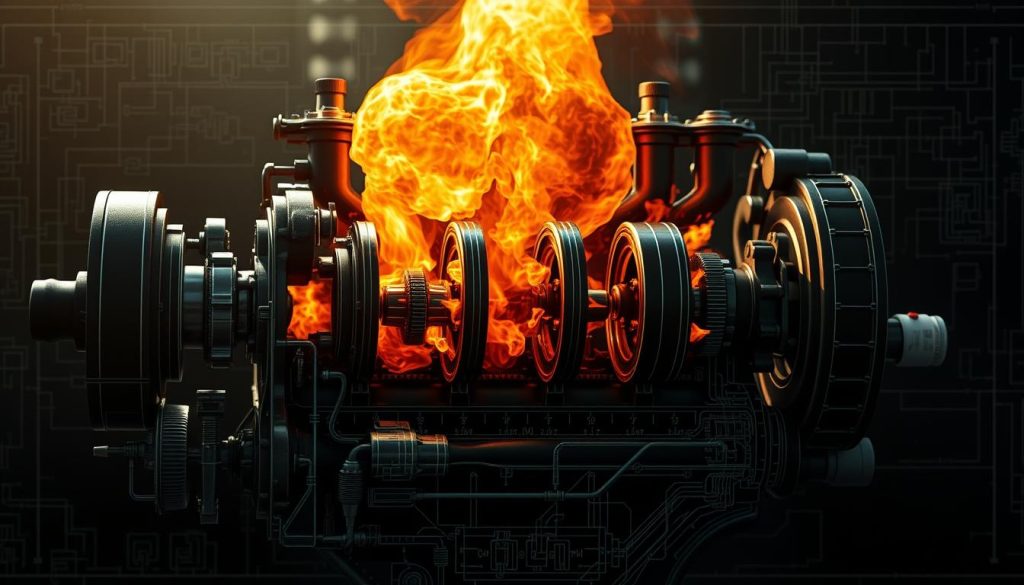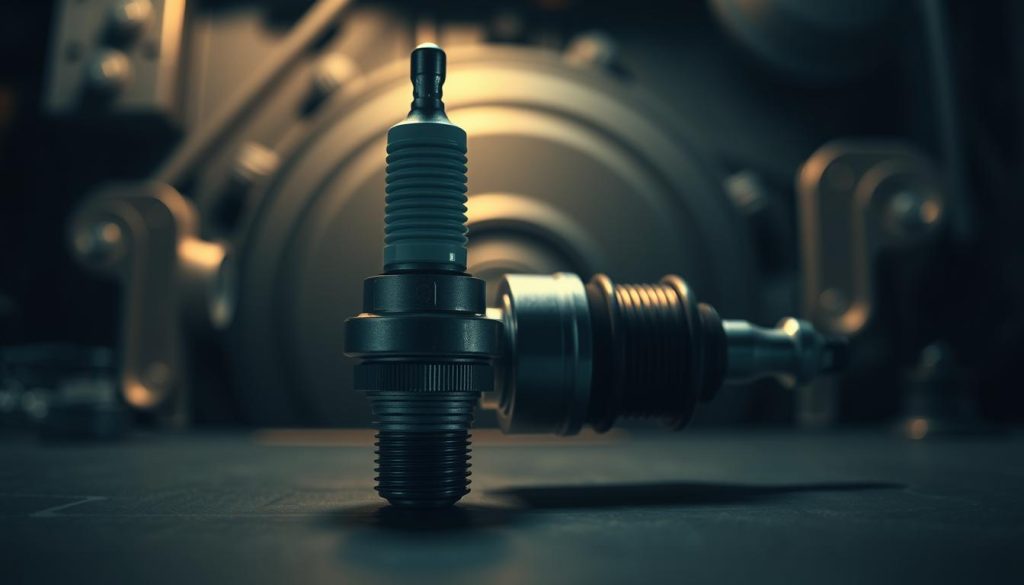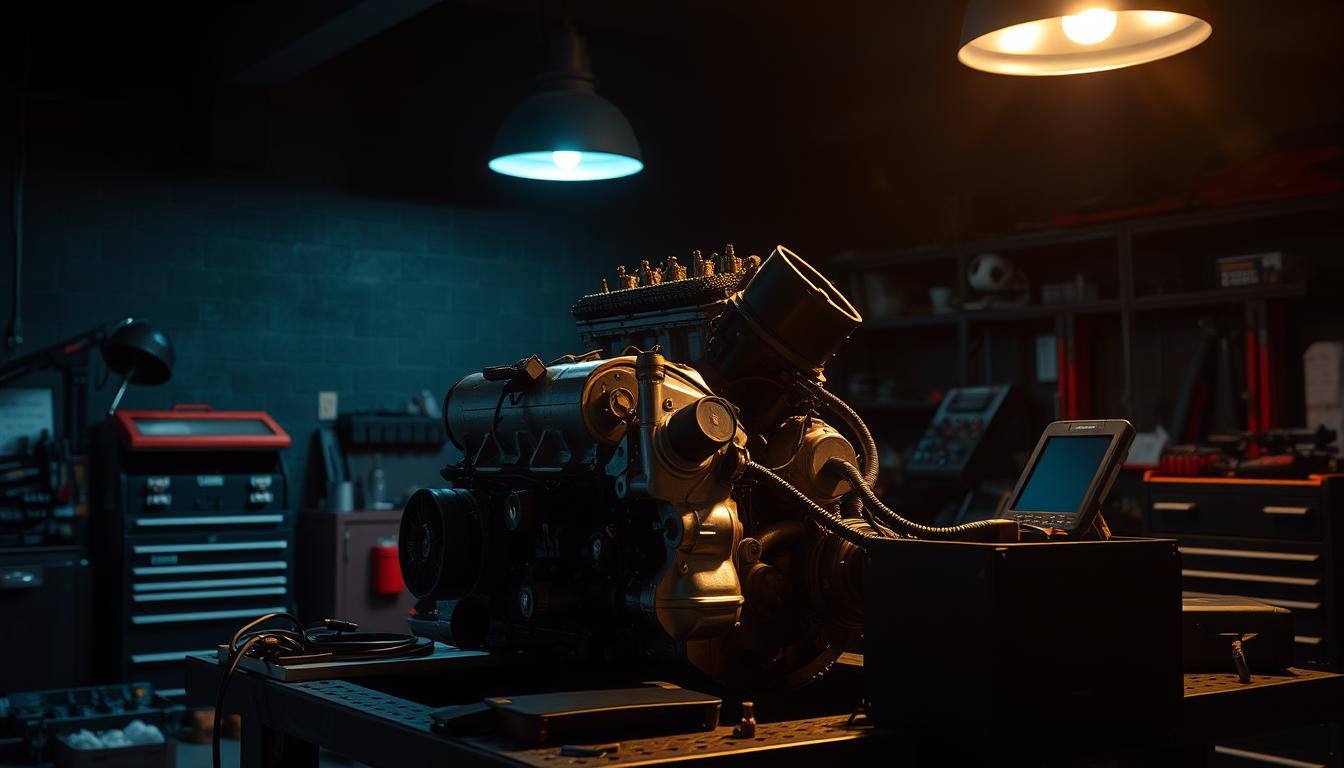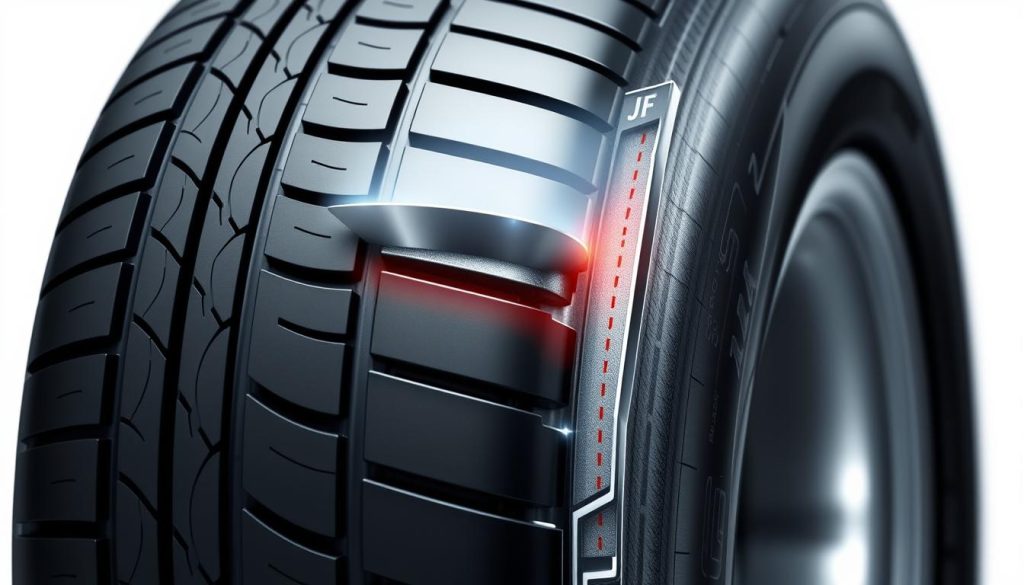When your car suddenly shakes or loses power, it could signal a serious problem under the hood. A misfire occurs when one or more cylinders fail to ignite fuel properly during the combustion process. This creates uneven power delivery, jerking motions, and unusual engine noises. At Heaven Automotive, we’ve seen firsthand how ignoring these symptoms leads to costly repairs down the road.
Combustion issues disrupt your vehicle’s performance and trigger warning lights on the dashboard. Unburned fuel entering the exhaust system can damage catalytic converters and oxygen sensors. Even a single skipped ignition cycle stresses critical components, reducing fuel efficiency and increasing harmful emissions.
Modern engines rely on precise timing between spark plugs, fuel injectors, and sensors. When this balance breaks, drivers notice rough idling or hesitation during acceleration. Our team emphasizes early diagnosis to prevent minor issues from becoming major headaches. Addressing the root cause quickly protects your investment and keeps your car running smoothly.
Key Takeaways
- Misfires occur when fuel fails to ignite properly in one or more cylinders
- Symptoms include shaking, power loss, and check engine warnings
- Unaddressed misfires damage exhaust systems and increase repair costs
- Reduced fuel efficiency and higher emissions impact both budgets and the environment
- Professional diagnosis ensures accurate identification of underlying causes
Understanding the Basics of a Misfiring Engine
A smooth-running vehicle depends on precise coordination between critical components under the hood. At Heaven Automotive, we emphasize that combustion requires perfect timing between fuel delivery, spark ignition, and exhaust management. When this process falters in any cylinder, drivers experience noticeable performance drops and potential long-term damage.

Definition and Core Concepts
Combustion fails when a cylinder’s air-fuel mixture doesn’t ignite properly. This leaves raw gasoline in the chamber instead of creating power. Our technicians often find these skipped cycles disrupt engine rhythm, causing vibrations and unburned fuel to enter the exhaust.
The Impact on Performance and Emissions
Power loss becomes evident during acceleration, while rough idling strains components. Uncombusted fuel overwhelms catalytic converters, leading to expensive repairs. Emissions spike as hydrocarbons exit the tailpipe unchecked, violating environmental standards.
Modern vehicles use complex systems that demand immediate attention to ignition issues. At Heaven Automotive, we prioritize identifying whether problems stem from spark timing, fuel injectors, or sensor errors. Quick action preserves drivability and prevents cascading damage.
Common Causes of a Misfiring Engine
At Heaven Automotive, we’ve identified three key systems that frequently contribute to ignition failures. While symptoms vary, most issues trace back to worn components or disrupted air-fuel ratios. Let’s explore the primary offenders our technicians encounter daily.

Issues with Spark Plugs and Ignition Coils
Worn spark plugs account for 40% of misfire cases we diagnose. Carbon buildup or cracked insulators prevent proper spark generation. Well-maintained vehicles typically need replacements every 75,000 miles, but stop-and-go traffic accelerates wear.
Ignition coils amplify voltage to create sparks. When these fail, cylinders receive weak or inconsistent energy. We often find cracked coil casings or internal shorts in high-mileage cars. Replacing all coils simultaneously prevents recurring issues.
Fuel System and Air Intake Problems
Clogged fuel filters starve engines of gasoline, creating lean conditions. Weak pumps or sticky injectors disrupt spray patterns, leaving cylinders fuel-starved. Last month, we fixed a Chevy Silverado whose misfire stemmed from a $15 filter clog.
Air leaks through cracked intake manifold gaskets dilute the fuel mixture. Excess oxygen prevents combustion, causing rough idling. Our pressure tests quickly pinpoint these stealthy vacuum leaks.
- Spark plug lifespan drops 30% in extreme heat or short trips
- Coil failures often follow water exposure or voltage spikes
- Fuel pressure below 45 PSI usually indicates pump issues
Recognizing the Warning Signs of an Engine Misfire
Your car communicates emerging issues through specific signals that demand attention. At Heaven Automotive, we decode these alerts using advanced diagnostics to prevent minor glitches from becoming major repairs.
Dashboard Alerts and Error Codes
When the check engine light illuminates, your vehicle’s computer has detected irregular combustion patterns. Our technicians frequently find codes P0301-P0308 during scans, pinpointing exactly which cylinder needs attention. These specific alerts help us address the root cause faster.
Physical Symptoms You Can’t Ignore
Drivers often notice unusual vibrations during acceleration or while stopped at lights. A healthy car idles smoothly – if yours shakes like a washing machine off balance, combustion issues likely exist. Popping noises from under the hood often accompany these sensations.
We’ve resolved cases where brief power loss during highway merging created dangerous situations. Hesitation when pressing the gas pedal typically means unburned fuel disrupts your car’s rhythm. Addressing these signs quickly prevents catalytic converter damage.
Our diagnostic process evaluates both electronic codes and physical symptoms. This dual approach catches problems other shops miss, saving you time and money. Don’t wait until stalling becomes frequent – early intervention keeps repairs affordable.
Diagnosing the Problem: Tools and Techniques
Modern vehicles require precise diagnostics to identify combustion issues effectively. At Heaven Automotive, our technicians use advanced tools to trace problems to their source, whether they stem from ignition components, fuel delivery, or sensor errors. This systematic approach saves time and prevents unnecessary part replacements.
Using Code Readers and Compression Testers
We start every diagnosis with professional OBD-II scanners that reveal specific error codes linked to troubled cylinders. These tools tell us whether the issue involves spark plugs, coils, or fuel injectors. For example, code P0304 pinpoints cylinder 4 failures, while P0171 indicates lean fuel mixtures.
Compression tests show if internal wear affects combustion pressure. Low readings often expose cracked valves or worn piston rings. We combine this with fuel pressure checks to rule out weak pumps or clogged filters causing lean conditions.
Inspection of Sensors and Vacuum Leaks
Faulty sensors trick your car’s computer into making poor decisions. We test mass airflow sensors and oxygen sensors for accuracy using multimeters and live data streams. Sticky throttle bodies or dirty MAF sensors account for 25% of airflow-related misfires we fix.
To find hidden air leaks, we spray carb cleaner near intake gaskets and hoses. RPM spikes reveal vacuum leaks that dilute fuel mixtures. Last week, this method helped us locate a $8 vacuum hose crack causing rough idling in a Ford F-150.
Our process connects digital diagnostics with hands-on testing. This dual strategy ensures we address root causes, not just symptoms. Trust our team to restore your vehicle’s performance efficiently.
Step-by-Step Guide to Fixing a Misfiring Engine
At Heaven Automotive, our repair strategy combines technical expertise with manufacturer-guided protocols. We prioritize solutions that address root causes while protecting your vehicle’s long-term health.
Replacing Spark Plugs and Ignition Components
We begin by confirming which ignition coil or spark plug requires replacement through systematic testing. When one component fails, we recommend updating both – installing new plugs adds only $25 per cylinder while preventing future issues. Our team follows exact torque specs and gap measurements tailored to your make/model.
Addressing Fuel Filter, Injector, and Air Leak Issues
Clogged fuel systems get immediate attention. If your filter exceeds 30,000 miles, we replace it first before testing pressure levels. For air leaks, we spray carb cleaner around engine seals – RPM spikes reveal faulty gaskets needing repair. This method helped us fix a Toyota Camry’s vacuum leak in 12 minutes last week.
Every repair concludes with road testing to verify smooth operation. Our approach eliminates guesswork, ensuring your car runs optimally without recurring problems. Trust our technicians to restore performance efficiently.



